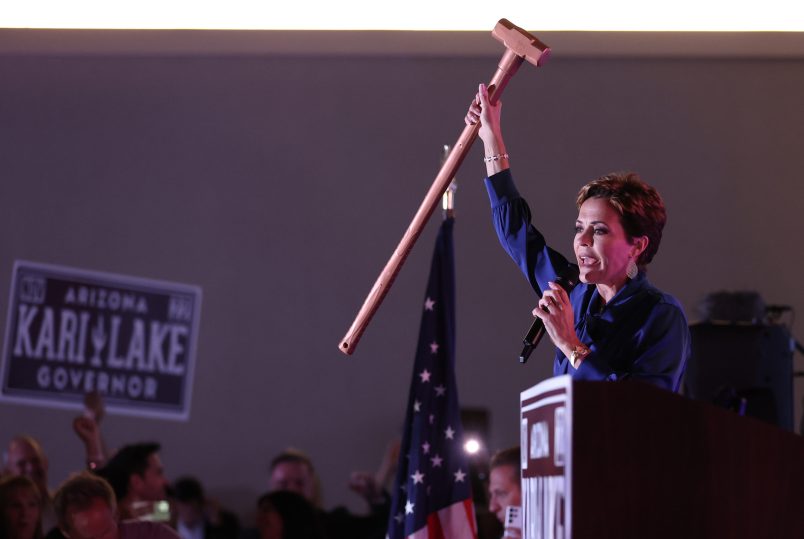Candidates who’ve pushed lies about the 2020 election, and who’ve campaigned on various schemes to limit or subvert democracy, did quite well in Tuesday’s primary elections in several states around the country.
Still, there’s one iron-clad law of lying about elections: Once you start, it’s not easy to stop.
Take Kari Lake, who’s on track to secure the GOP nomination for Arizona’s governor race. Lake alleged fraud before the votes were even counted — a well–worn strategy employed by other Big Liars across the country, because it has no discernible consequences, aside from degrading the democratic process.
“We’re already detecting some stealing going on, but you guys know I’m a fighter right?” she said at a campaign stop Monday. “You haven’t seen me when they try to steal something. I’m gonna go supernova radioactive. We’re not gonna let them steal an election.” Time and again, pressed for any evidence at all that there’d been cheating, Lake simply refused to share details of the alleged crime.
“I’m not telling you about it,” Lake told NBC News’ Vaughn Hillyard on Monday.
Sure enough, at the beginning of the night Tuesday — when she was trailing her opponent — Lake retweeted the account of an anonymous supposed poll worker who claimed “10-15%” of ballots had been “smeared” as a result of the type of pens election officials were using. The Trump-allied pundit and Turning Point USA founder Charlie Kirk referred to the supposed phenomena as “Sharpiegate 2.0,” an homage to the debunked conspiracy theory that ballots were spoiled due to pen type in 2020.
Then… in-person Election Day results started rolling in, bumping up Lake’s support. Eventually, Lake took the lead. Her tone, understandably, changed. “There is no path to victory for my opponent, and we won this race, period,” Lake announced triumphantly at a party, even though she was still technically behind in the ballots counted at that point.
In 2021, Lake scoffed at the idea that Joe Biden could overtake Donald Trump’s lead in several states as ballot-counting continued after Election Day. “It’s magic!” she said. This time around, Lake’s campaign sent a tweet in the wee morning hours Wednesday, showing the moment she “found out she won the election.” (Note: News organizations, including TPM, have not called the election yet, considering it still too close to make a final determination of the winner.)
Other cases of election denialism Tuesday were a bit more textbook. Take Ryan Kelley, a Michigan gubernatorial candidate who’s accused in criminal charges of scaling the Capitol steps on Jan. 6, and who has called the legitimate 2020 election results themselves “the BIG LIE and insurrection.”
Kelley alleged fraud had occurred when his Trump-endorsed, DeVos-backed opponent Tudor Dixon came out on top. Kelley placed fourth.
“NOT CONCEDING!” he wrote on Facebook. “Let’s see the GOP and the predetermined winner call for a publicly supervised hand recount to uphold election integrity.”
Such was also the case for Mike Detmer, a state Senate candidate in Michigan who trails his opponent by double digits, the Detroit News’ Craig Mauger noted.
“I’m calling bullshit!” Detmer wrote on Facebook, adding: “It appears that the crooked, bought-and-paid-for SWAMP candidates won most of the elections last night with only a few exceptions. I’m just not buying it folks.”
In Arizona, perhaps the most prominent election denier in the state sounded a similar note — even though he won the race for the GOP secretary of state nomination.
“I’ve got people all over the state saying, I’ve gotten ballots that I didn’t ask for,” State Rep. Mark Finchem, announced to the crowd at Lake’s party, referring to the nomination he’d just secured.



